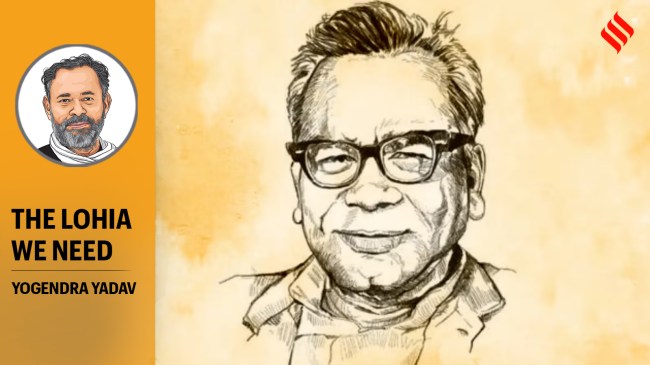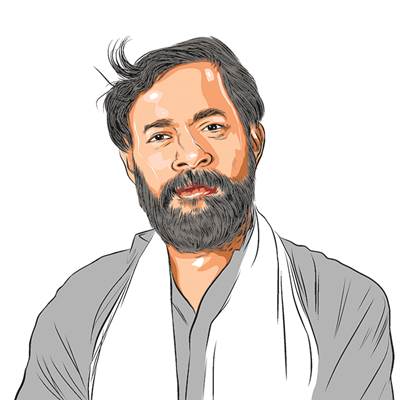Opinion Yogendra Yadav Writes: The Ram Manohar Lohia we need
His political thinking offers an ideological resource that is desperately needed to defend our republic today
 Ram Manohar Lohia.
Ram Manohar Lohia. On March 23, the 115th birth anniversary of Ram Manohar Lohia, Prime Minister Narendra Modi remembered him as a “visionary leader, fierce freedom fighter and an icon of social justice”. With the usual exception of Lohiaite socialist parties like the Samajwadi Party and the Rashtriya Janata Dal, the Opposition has made little attempt to draw upon Lohia’s political and ideological legacy. His legacy remains shrouded in distorted memories of his mercurial politics. Lohia’s most potent ideas — his reformulation of the received socialist doctrine and the accompanying political and policy prescriptions — have not travelled beyond a small and dwindling band of Lohiaites. This is a tragedy, not just for the INDIA bloc, but also for India.
This is not the first time that Modi and other BJP leaders have invoked Lohia. Many of his stances and catchphrases have been twisted by BJP ideologues to serve their ends, contradicting Lohia’s political positions. His attacks on Jawaharlal Nehru are relished by BJP leaders, and used to push agendas on which Lohia would have actually agreed with the former PM. His “anti-Congressism” has been used as a stick with which to beat Congress and as a fig leaf by some ex-socialists to defend their alliance with the BJP. His slogan of “Banish English” is used to support Hindi imposition, and his staunch support for backward castes is often used as a justification for the capture of power by dominant OBCs.
A recovery of Lohia’s legacy must begin by correcting these distortions. “Anti-Congressism” was not a political philosophy; it was a short-term tactic of anti-establishment politics. Lohia began his political journey with Congress and had opposed the idea of socialists leaving the party after Independence. He advocated “anti-Congressism” in the 1960s, in the heyday of Congress dominance. There is little doubt that if Lohia had been around today, he would have advocated “anti-BJPism”, and Opposition unity against today’s political establishment.
Similarly, Lohia was not against English, a language he relished and used with great felicity and flair. He opposed the hegemony of English — not because it was a foreign language, but because it represented feudalism and class inequalities. Far from being a Hindi supremacist, Lohia was a passionate advocate of all Indian languages. No wonder he inspired leading writers in many Indian languages, including Hindi (Phanishwar Nath Renu, Raghuveer Sahay, Sarveshwar Dayal Saxena, Vijaydev Narayan Sahi), Assamese (Birendra Kumar Bhattacharya) and Kannada (U R Ananthamurthy, Poornachandra Tejaswi, P Lankesh and Siddalingaiah). He would have stood against the imposition of Hindi and for the unity of all the Indian bhashas.
Lohia’s policy on social justice was not focused only on OBCs. It so happens that Lohia’s socialist party became the political vehicle for the entry of OBCs in the Hindi heartland, especially Bihar and Uttar Pradesh. What Lohia argued for was a comprehensive policy of preferential opportunities. While invoking his demand for 60 per cent quota for backwards — captured in his slogan “pichhada pave sau me saath” — it is often forgotten that, for Lohia, “pichhada” included OBCs, Dalits and Adivasis as well as women. He saw gender injustice as the primary one among the six forms of injustice that called for saptakranti, seven revolutions. He maintained that women, cutting across caste and class, were equivalent to Shudras and were entitled to preferential opportunities. A supporter of a graded response to the system of graded inequalities, Lohia would have supported special opportunities for the extremely backward among OBCs and Mahadalits among SCs. Lohia’s position on social justice — an intersectional approach that combined caste, class and gender — can be the basis for a social bloc at the bottom of the pyramid that is needed to take on the BJP’s hegemony today.
One of the central challenges of secular politics today is its lack of cultural resources rooted in our civilisational heritage and nationalist imagination. Lohia’s use of the cultural alphabet for a radical socialist politics can help fill this vacuum. Lohia came up with striking metaphors for political action. According to him Draupadi, the wise, witty, fearless and independent-minded heroine of the Mahabharata, was the ideal of Indian womanhood, as opposed to the meek and obedient image of Sati-Savitri. Lord Rama was for him the symbol of north-south unity in India and Lord Krishna that of east-west unity. Long before the dawn of ecological consciousness, Lohia decried our inattention to the state of our rivers while presenting them as carriers of values: The Ganga and the Sarayu were rivers of kartavya, while the Yamuna and its tributaries were rivers of rasa. He drew upon the tale of Nachiketa in the Ishopanishad to render the socialist idea of transcending private property as kanchanmukti. No wonder Lohia influenced many artists, including M F Husain, whose famous Ramayana and Mahabharata series were inspired by him.
Lohia’s critique of Hindu communalism was articulated through the figures of Vashishtha and Valmiki. The former represented the narrow creed of upper-caste Hindus — fearful, suspicious of the other and repressive to those below — that dominates the Indian mind when it is in retreat. The latter represents the liberal tradition within Hinduism that is open to internal reforms, demands for justice and external influences. What is presented as Hindus vs Muslims or other minorities is, at its core, a clash between two streams within Hinduism. When the liberal streak dominates Hinduism, India is on the ascent. The rise of illiberal or narrow Hinduism — as in recent times — is associated with India’s decline as a nation and a civilisation.
The relevance of a political thinker is not limited to his usefulness to contemporary politics. Beyond the above, Lohia’s enduring legacy is that he provided the philosophical foundations for India’s own modernity. He offered a rigorous critique of the Eurocentric assumptions of Western theories, including Marxism and Western socialism. At the same time, he did not fall for romantic nativism and its mythology of our great past. While firmly committed to social and economic egalitarianism, Lohia also laid the grounds for the politics and culture of decolonisation. He drew the blueprint for a new form of radicalism. You may or may not agree with Lohia. Many of his formulations may not stand the test of time and may need radical revision today. But Lohia’s political thinking offers an ideological resource that is desperately needed to defend our republic today.
The writer is member, Swaraj India, and national convenor of Bharat Jodo Abhiyaan. Views are personal





